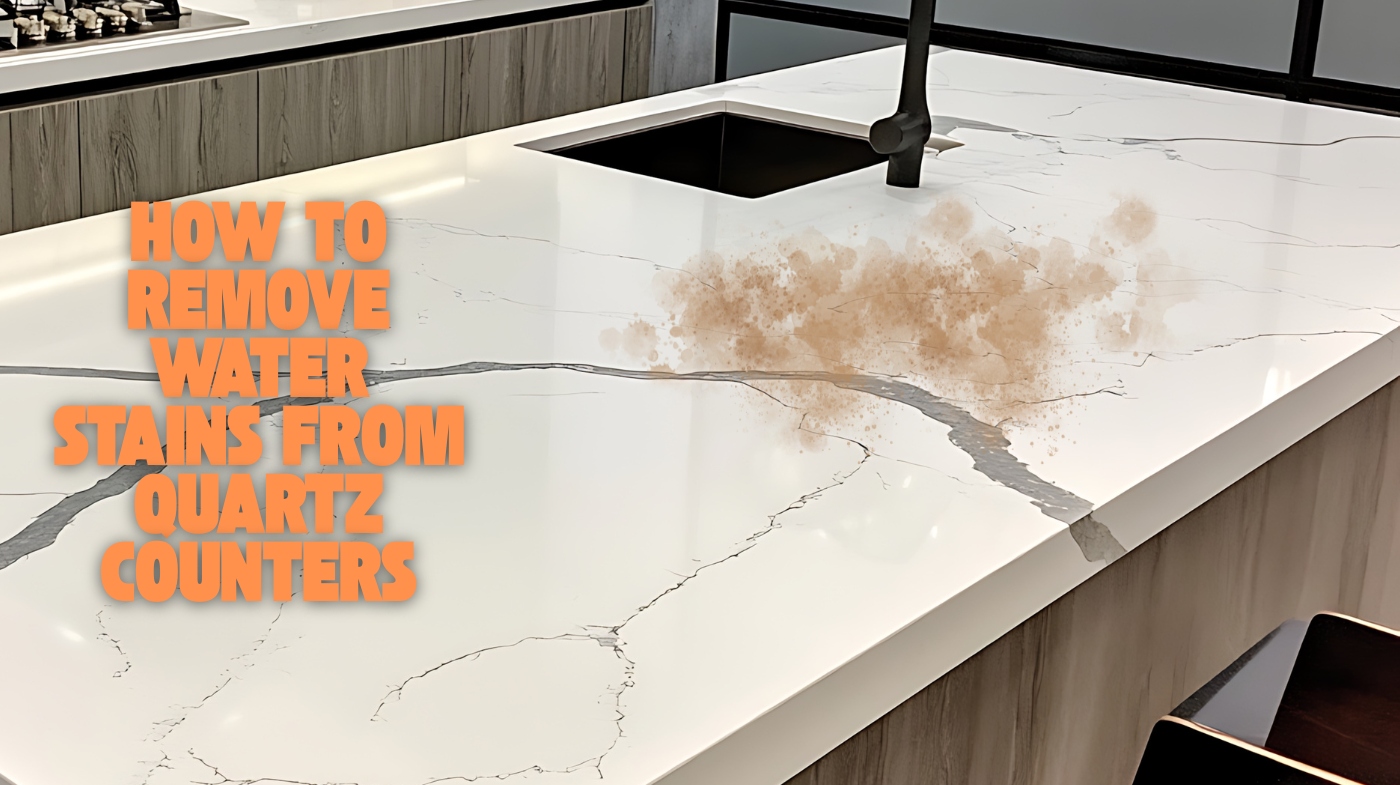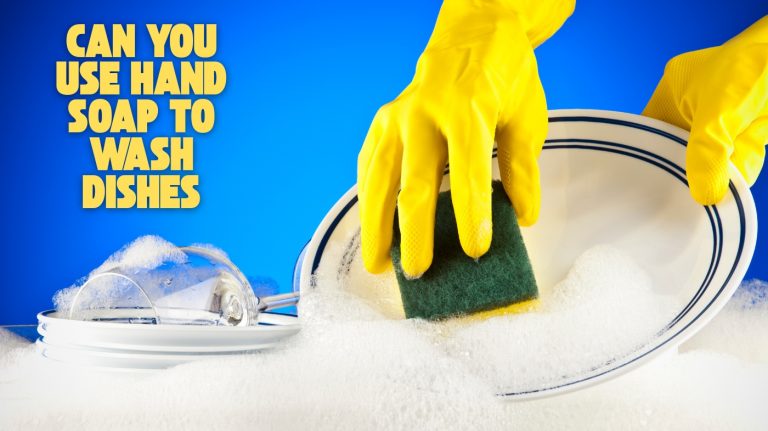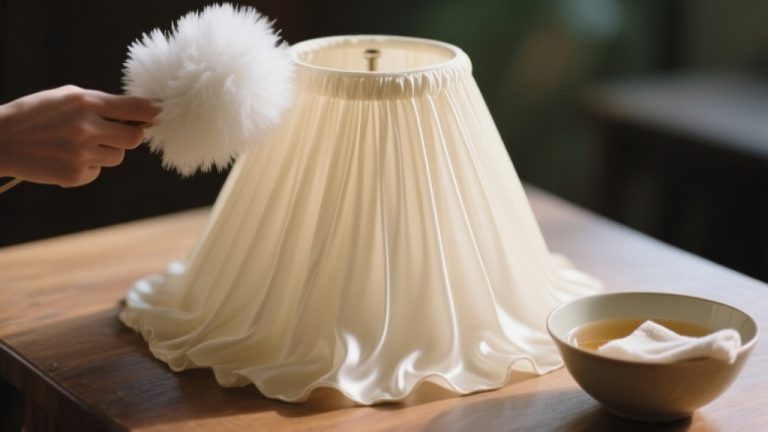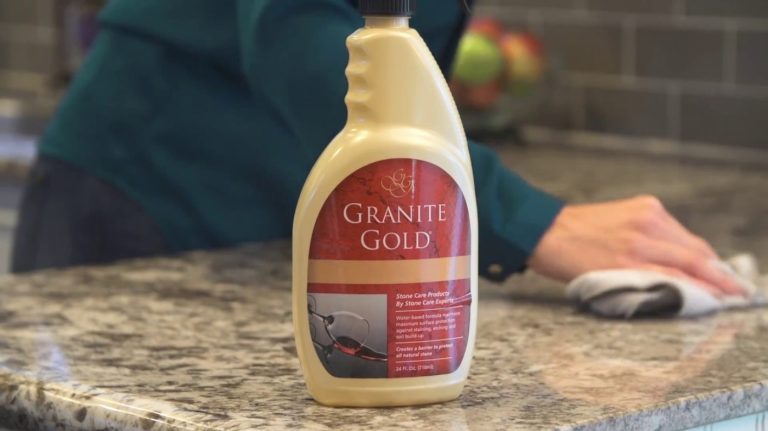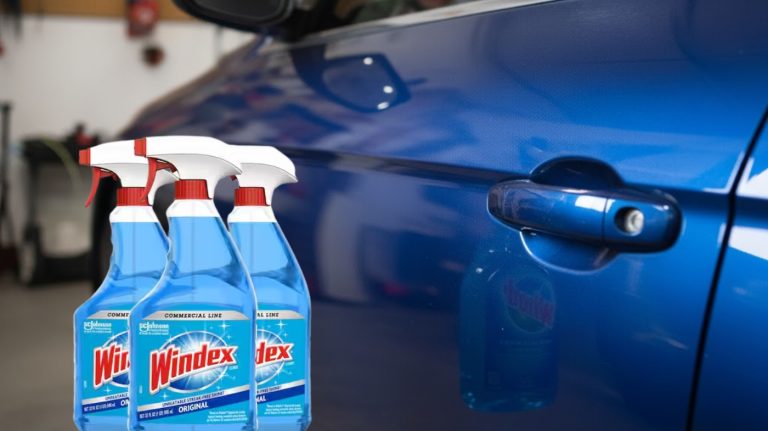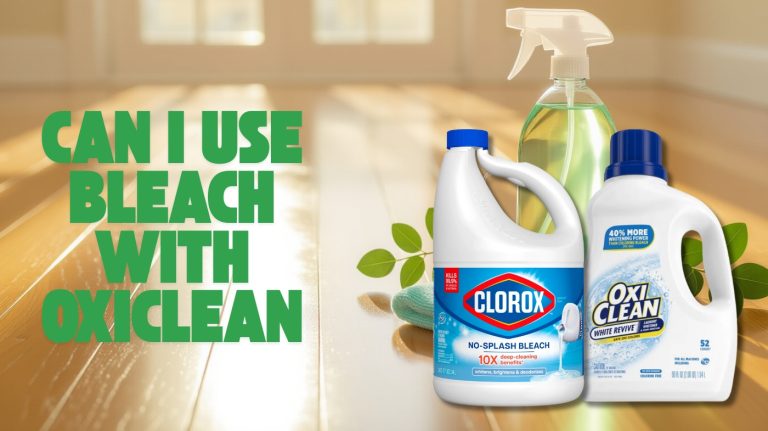How to Remove Water Stains From Quartz Counters? Easy Guide
To remove water stains from your quartz counters, start by wiping the area with mild dish soap and warm water using a soft microfiber cloth, then dry thoroughly.
For tougher stains, gently scrub with a baking soda paste and rinse well. Avoid harsh chemicals and abrasive tools to protect the surface.
Always clean spills promptly to prevent mineral buildup. Keep your quartz looking its best with these simple steps, and you can explore more detailed care techniques to maintain its shine and durability.
Key Takeaways
- Wipe water stains with mild dish soap, warm water, and a microfiber cloth, then dry the surface thoroughly to prevent new marks.
- For stubborn stains, apply a baking soda paste, let sit for 1–2 days under plastic wrap, then gently scrape and rinse.
- Use soft, non-abrasive scrubbers and pH-neutral cleaners designed for quartz to avoid scratching or damaging the surface.
- Avoid harsh chemicals like bleach, ammonia, and acidic cleaners that can degrade the resin and cause discoloration.
- Regularly clean spills immediately, dry the surface, and protect with coasters and trivets to maintain a stain-free quartz countertop.
Understanding Quartz Countertop Surfaces
Because quartz countertops combine crushed quartz with polymer resins, they offer a surface that’s both durable and non-porous.
You benefit from a countertop made of about 90-95% crushed quartz and 5-10% resin binders, creating a consistent, hard surface that ranks 7 on the Mohs hardness scale.
This means your countertop resists scratches, impacts, and chemical reactions. The resin adds flexibility, reducing the risk of cracks compared to natural stone.
Quartz also requires minimal maintenance compared to materials like unlacquered brass, which need regular care to prevent tarnish.
Since quartz countertops are non-porous, they won’t absorb liquids or bacteria, so you don’t need to worry about sealing.
This also makes them highly stain-resistant and easy to maintain. Their sustainable production, often incorporating recycled materials, adds eco-friendly value to your durable, hygienic kitchen or bathroom surface.
However, it’s important to remember that while quartz is heat resistant, placing hot pots directly on the surface can still cause damage, so using trivets or hot pads is advised.
Initial Cleaning Techniques for Water Stains
While quartz countertops resist deep stains due to their non-porous surface, water stains can still leave visible marks that require prompt attention. Start by mixing mild dish soap with warm water and gently wiping the stained area with a microfiber cloth.
Dry thoroughly to prevent new marks. Because quartz is designed to be stain resistant, spills and stains tend to sit on the surface, making them easier to clean when addressed quickly.
Ensuring proper moisture control during cleaning helps prevent further water damage and surface deterioration.
For more stubborn stains, make a baking soda paste and apply it gently in circular motions. Always rinse and dry afterward.
| Method | Key Steps |
|---|---|
| Warm Water & Mild Soap | Wipe with soapy cloth, then dry |
| Baking Soda Paste | Apply paste, gently rub, rinse, and dry |
| Quartz-Safe Cleaners | Use pH-neutral cleaner, follow instructions |
| All-Natural Compounds | Use stone-safe scrubs, rinse, and dry |
These initial steps prepare your quartz for deeper cleaning if needed.
Using Soft Scrubbers to Lift Mineral Deposits
Choose a soft scrubber like a nylon brush or non-abrasive pad to protect your quartz’s polished surface while removing mineral deposits.
Pre-wet the area and apply a stone-safe cleaner before gently scrubbing in circular motions. It is important to avoid harsh chemicals that could degrade the surface or cause discoloration.
Using a non-acidic, non-toxic compound designed specifically for stone surfaces ensures you clean effectively without causing damage. This approach lifts stains effectively without damaging the countertop’s finish.
Soft Scrubber Selection
When selecting a soft scrubber for quartz counters, you’ll want to focus on non-abrasive, pH-neutral gels or liquids that lift mineral deposits without harming the surface.
Avoid gritty or powdered scrubs, as they can dull or scratch quartz. Products like Soft Scrub Liquid Gel with Bleach (green bottle) are often recommended for tougher stains, but rinse thoroughly after use to prevent damage.
Choose soft sponges, dishcloths, or soft-bristled brushes designed for delicate surfaces to apply the scrubber gently. Always test the product on a small, hidden area first to check for any reaction.
Stick to pH-balanced formulas that preserve the resin and gloss of your quartz counters, ensuring effective mineral deposit removal while maintaining the countertop’s finish and longevity.
Because quartz countertops are made with polymer resins and pigments, maintaining a pH-neutral cleaning environment helps protect these components from degradation. Using non-toxic cleaning products also helps maintain surface integrity and safety during routine maintenance.
Gentle Circular Scrubbing
How can you effectively lift mineral deposits from your quartz counters without risking damage? Use gentle circular scrubbing with a soft microfiber cloth or non-abrasive sponge dampened in warm soapy water or a specialized quartz cleaner.
This method evenly distributes the cleaner and breaks down mineral build-up without scratching the surface. Quartz countertops have a high-density, nonporous surface that resists scratches, making gentle cleaning effective and safe.
Avoid pressing too hard to maintain the quartz finish. It is important to use a pH-neutral cleaner to preserve the quartzite’s protective sealant and avoid discoloration.
Follow these key steps:
- Scrub in small 2×2 foot sections using gentle circular motions.
- Rinse thoroughly with fresh water to remove residues.
- Dry immediately with a soft towel to prevent new water spots.
This technique ensures even cleaning, reduces streaking, and helps stubborn stains lift safely while preserving your quartz countertop’s integrity.
Baking Soda Paste for Stubborn Stains
Although stubborn stains on quartz counters can be challenging, you can tackle them effectively by preparing a baking soda paste. Mix baking soda with warm water to form a thick, spreadable paste.
Apply it generously over the stain, cover with plastic wrap, and let it sit 1–2 days. Quartz’s porosity allows the paste to penetrate and draw out stains deeply.
Using a cover like plastic wrap helps maintain the paste’s moisture, which is crucial for deep mineral extraction. Afterward, gently scrape off the dried paste and rinse thoroughly. Repeat if needed, but avoid abrasive scrubbing.
| Step | Action | Tip |
|---|---|---|
| Mix | Baking soda + warm water | Paste should be thick |
| Apply | Spread on stain + cover | Use spatula, cover with wrap |
| Wait | 1–2 days undisturbed | Keep paste moist |
| Clean | Scrape + rinse + dry | Use soft cloth, no abrasives |
Safe Cleaning Products and Chemicals to Avoid
You’ll want to stick to gentle cleaners like mild dish soap, pH-neutral stone cleaners, or a diluted vinegar solution when tackling water stains on quartz.
Quartz countertops are non-porous and easy to clean, making gentle cleaning effective without the need for harsh chemicals. Avoid harsh chemicals such as bleach, ammonia, and acidic substances like undiluted vinegar or lemon juice, as they can damage your countertop’s surface.
When using vinegar, always dilute it and rinse thoroughly to protect the quartz’s finish. Using absorbent materials to blot spills quickly can help prevent stains from setting and protect your countertop’s appearance.
Recommended Gentle Cleaners
When caring for quartz countertops, choosing gentle cleaners is essential to maintain their durability and shine. Mild dish soap mixed with warm water is your go-to for daily cleaning, safely preserving the resin that bonds quartz.
Regularly wiping up spills immediately also helps prevent staining risks. Using non-abrasive application methods such as soft cloths helps ensure the surface remains undamaged.
You can also use pH-neutral commercial cleaners designed for quartz; they remove grease and watermarks without dulling the surface.
For tougher residues, gentle multi-purpose cleaners like Mr. Clean or Simple Green work well without harming your countertop.
Try these recommended options:
- Mild dish soap with warm water and a soft cloth
- pH-neutral quartz-specific cleaners, tested on a small area first
- Non-abrasive multi-purpose cleaners for stubborn spots
Always use soft microfiber cloths or sponges to avoid scratches and maintain a polished look.
Harsh Chemicals to Avoid
Since quartz countertops rely on a resin matrix to hold their structure and shine, you need to steer clear of harsh chemicals that can break down this bond.
Avoid bleach and chlorine-based cleaners because they dull the finish, weaken resin bonds, and can cause cracks over time. Using cleaning tools with abrasive bristles or scrapers can also damage the surface, so choose gentle options designed for delicate materials.
Ammonia and ammonia-containing products also degrade the resin, leading to dullness and fractures even in small amounts. Stay away from strong acids or alkaline cleaners like oven or paint strippers, as they discolor and etch the surface.
Abrasive cleaners and scrubbing pads scratch the quartz, damaging its protective layer. Using abrasive sponges and scouring pads may leave scratches. In conclusion, solvents like nail polish or paint removers dissolve resin, risking permanent staining and weakening.
Stick to gentle, quartz-safe products to maintain your countertop’s durability and appearance, and consider using ergonomic cleaning tools to avoid applying excessive pressure during maintenance.
Safe Use of Vinegar
How can you safely use vinegar to clean your quartz countertops without causing damage? First, always dilute white vinegar with water in a 1:1 ratio to reduce acidity. Apply the solution sparingly with a soft cloth or sponge, avoiding frequent use.
After cleaning, rinse thoroughly with warm water and dry completely to prevent etching and water spots. It is important to note that quartz is non-porous and does not require harsh acids for cleaning, making gentle care essential.
Keep these guidelines in mind:
- Perform a spot test on a hidden area before full application.
- Use circular motions to avoid acid concentration on one spot.
- Never combine vinegar with other strong chemicals.
- It is important to rinse thoroughly after using vinegar to remove any residue that might harm the quartz surface.
Preventative Measures to Keep Quartz Stain-Free
Although quartz is durable and resistant to stains, taking preventative measures is essential to keep your countertops looking pristine. Promptly wipe spills with a soft cloth, avoid harsh chemicals, and never place hot pots directly on the surface.
Using protective accessories like cutting boards and coasters also helps prevent stains and scratches. Since quartz is composed of natural stone and resin, its stain resistance depends on proper maintenance to prevent discoloration.
| Preventative Measure | Practical Tip |
|---|---|
| Immediate Spill Cleanup | Blot spills first, then wipe gently |
| Protective Accessories | Use trivets, cutting boards, coasters |
| Proper Cleaning | Clean daily with mild soap, dry surface |
| Temperature Control | Avoid direct hot pots, harsh chemicals |
Tips for Maintaining the Beauty of Quartz Counters
Keeping your quartz counters looking their best goes beyond preventing stains. Regular care preserves their gloss and durability. Clean daily with warm water and a soft cloth, using mild dish soap when needed.
Avoid harsh chemicals like bleach or acetone, which can damage the surface. Quickly wipe spills to reduce discoloration risks, especially with substances like coffee.
To maintain beauty:
- Use non-abrasive scrub pads and approved cleaners for tough spots.
- Always rinse and dry surfaces after cleaning to prevent soap residue and water spots.
- Protect counters from heat by using trivets under hot cookware.
- Remove objects from the surface before cleaning to ensure thorough cleaning.
Sanitize regularly with 70% isopropyl alcohol or gentle disinfectants to keep your counters hygienic without harming the finish. These steps keep your quartz counters vibrant and lasting.
Frequently Asked Questions
Can Hard Water Stains Damage Quartz Permanently if Left Untreated?
No, hard water stains won’t permanently damage your quartz countertops if left untreated. The stains only sit on the surface as mineral buildup and don’t penetrate or weaken the material.
However, letting them build up can dull the finish and make them harder to clean later.
To keep your counters looking great, you should clean spills promptly and avoid harsh cleaners that could harm the resin coating protecting your quartz.
Is It Safe to Use Steam Cleaners on Quartz Countertops?
You shouldn’t use steam cleaners on quartz countertops regularly because the high heat and moisture can soften the resin binders and damage the surface sealant.
Occasional, very cautious use with a low-temperature home steam cleaner might be okay, but it’s safer to avoid steam altogether.
Instead, stick to mild dish soap, warm water, and a soft cloth for cleaning. This approach preserves your quartz’s finish and prevents dullness or discoloration over time.
How Often Should Quartz Counters Be Professionally Sealed or Polished?
You don’t need to worry about professionally sealing or polishing your quartz counters at all. Quartz is engineered with a factory seal and finish that lasts, so no regular sealing or polishing is necessary.
Just keep your surface clean with mild soap and water, and avoid harsh chemicals. If you ever notice serious damage, professionals can help, but for routine care, your own gentle cleaning will keep quartz looking pristine without extra treatments.
Are There Any Natural Oils That Can Help Protect Quartz Surfaces?
You shouldn’t rely on natural oils to protect quartz surfaces. Oils like peppermint, lemon, or lavender essential oils can add scent or cleaning benefits but don’t form a protective barrier.
In fact, natural oils can leave residues or attract dirt, which harms your quartz.
Instead, stick to regular cleaning with mild soap and water or use a commercial quartz cleaner designed for protection and stain resistance.
Can Water Stains Cause Bacteria Growth on Quartz Countertops?
Think of water stains on your quartz countertop as fleeting shadows—they hint at moisture but don’t dig deep.
Because quartz’s nonporous surface acts like a fortress, water stains won’t foster bacteria growth directly.
However, if you let water spots linger, they can trap dirt or food residue, which might encourage bacteria.
Keep Your Quartz Spotless
If you’ve ever spilled water on your quartz countertop and noticed stains, like Sarah did after a weekend barbecue, you know how frustrating it can be.
By gently scrubbing with a soft cloth or using a baking soda paste for tougher spots, you can easily restore your quartz’s shine. Avoid harsh chemicals, and wipe spills promptly to keep your counters looking flawless. With regular care, your quartz surface will stay beautiful and stain-free for years.

